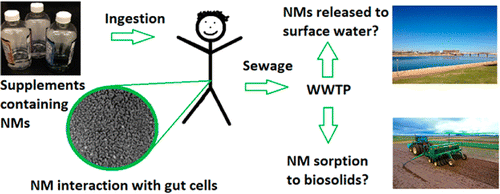Nanoparticles from dietary supplement drinks likely to reach environment, say scientists

Nanoparticles are becoming ubiquitous in food packaging, personal care products and are even being added to food directly. But the health and environmental effects of these tiny additives have remained largely unknown. A new study now suggests that nanomaterials in food and drinks could interfere with digestive cells and lead to the release of the potentially harmful substances to the environment. The report on dietary supplement drinks containing nanoparticles was published in the journal ACS Sustainable Chemistry & Engineering.
Robert Reed and colleagues note that food and drink manufacturers use nanoparticles in and on their products for many reasons. In packaging, they can provide strength, control how much air gets in and out, and keep unwanted microbes at bay. As additives to food and drinks, they can prevent caking, deliver nutrients and prevent bacterial growth. But as nanoparticles increase in use, so do concerns over their health and environmental effects. Consumers might absorb some of these materials through their skin, and inhale and ingest them. What doesn't get digested is passed in urine and feces to the sewage system. A handful of initial studies on nanomaterials suggest that they could be harmful, but Reed's team wanted to take a closer look.
They tested the effects of eight commercial drinks containing nano-size metal or metal-like particles on human intestinal cells in the lab. The drinks changed the normal organization and decreased the number of microvilli, finger-like projections on the cells that help digest food. In humans, if such an effect occurs as the drinks pass through the gastrointestinal tract, these materials could lead to poor digestion or diarrhea, they say. The researchers' analysis of sewage waste containing these particles suggests that much of the nanomaterials from these products are likely making their way back into surface water, where they could potentially cause health problems for aquatic life.
More information: "Characterization of Nanomaterials in Metal Colloid-Containing Dietary Supplement Drinks and Assessment of Their Potential Interactions after Ingestion" ACS Sustainable Chem. Eng., Article ASAP. DOI: 10.1021/sc500108m
Abstract
Little information is available regarding the suitability of analytical methods to evaluate claims regarding the presence of engineered nanomaterials (NMs) in consumer products, their potential toxic effects to humans, or their life cycle after product use. This study was designed to assess the potential interactions across the life cycle of eight commercially available dietary supplement drinks from a single vendor, all purported to contain metal NMs. Analysis showed that all of the products contained metallic NMs with average diameters below 50 nm as determined by dynamic light scattering and transmission electron microscopy. The products' intended use is human ingestion; in order to examine potential human health effects after ingestion, we investigated the interaction of NMs in the drinks with an in vitro cell system that faithfully mimics human intestinal cells. After exposure to concentrations of NMs as low as 3.5 μg/mL, we found that the number of microvilli decreased relative to untreated controls for all drinks. From a life cycle perspective, consumption of drinks containing NMs will eventually result in sewer discharge of these NMs in feces. Screening tests for NM removal by biosolids in wastewater treatment plants (WWTPs) conducted using the NMs contained in supplement drinks showed variable removal of NMs, with the fractions removed ranging from (99 ± 27)% to (30 ± 0.05)%. The results showed that metal NM-based supplements may have an effect on the number of viable human intestinal microvilli and will likely enter the environment via either water or solids released from WWTPs.
Provided by American Chemical Society

















